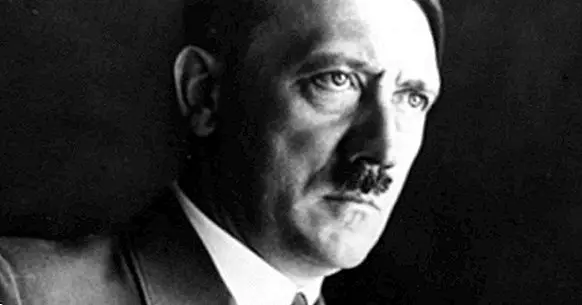The psychological profile of Adolf Hitler: 9 personality traits
If someone asks us the name of some of the people who have generated more deaths throughout modern history, it is easy to come to our mind the name of Adolf Hitler .
This German military man and politician of Austrian origin, responsible for the start of the Second World War and the death of millions of people under his command as Führer, has been one of the most feared historical figures of modernity.
The characteristics of his personality and his skills of leadership and manipulation, as for example could be observed in his ability in the use of rhetoric and oratory, have been studied since then. In this article we will try to offer the psychological profile of Hitler from the profiles made by Murray and the visualization of graphic and literary documents.
- Maybe you're interested: "Jack the Ripper: analyzing the psychology of the famous criminal"
Adolf Hitler: analysis difficulties
Establishing a psychological profile of a specific person without observing or analyzing their behavior and characteristics directly is complicated and ineffective, since a real psychological exploration can not be performed. Any psychological profile carried out to a person without having mediated contact between the health professional and the subject in question is more imprecise, which also occurs at the time of elaborating the psychological profile of a deceased person.
In the case of Hitler, there is no evidence that he submitted to a psychiatric evaluation, and the professionals who were in direct contact with him died, probably being executed by the SS or sent to concentration camps. The only way to try to establish something similar to a psychological profile is the analysis of his speeches, his acts and the ideas he conveyed through writing.
The psychological profile of Hitler
The personality of Adolf Hitler was an aspect that greatly troubled different governments during the Second World War. At the time in which he lived, various researchers and experts were commissioned to establish a psychological profile of the dictator. Specifically highlights those made by Henry Murray for the Office of Strategic Services (Office of Strategic Services or OSS, forerunner of the current CIA) and by Joseph MacCurdy , both profiles being consistent.
However, it must be taken into account that neither of the two authors had direct contact with the analyzed one, so that the profiles prepared were made from the analysis of different materials and not from the exploration of the individual.
The main personality characteristics of Adolf Hitler that can be extracted from these reports, as well as from the different documentary sources, both audiovisual and written, include the following considerations.
1. Egolery and Messiah complex
In the different speeches and documents that remain of the dictator, it is possible to observe how Adolf Hitler was considered a chosen force to lead Germany and take it to victory. He considered himself an embodiment of good, destined to lead his people.
This fact would be favored by the worship of a large part of the German people during his rise to power. At present, it could be considered that it was a case of delirium of self-reference.
2. Difficulties for privacy
The intimate life of Hitler, apart from his relationship with Eva Braun, is little known. However, the records of the time seem to indicate that while the dictator could unfold a great charm with those around him and followed, he had severe problems to establish deep relationships, partly because of the difficulty that it involved Express your feelings as regards affection.
3. Feelings of inferiority and self-contempt
The different studies and profiles that have been carried out of his personality and his history indicate that the dictator he had a strong inferiority complex , which in turn impelled him to seek superiority and self-affirmation. In fact, the report prepared by Murray highlights the presence of a weak ego structure, possibly a product of the mistreatment to which he was subjected by his father.
It is also partly revealing that the Aryan race that he praised enjoyed characteristics that he lacked, something that seems to favor the idea of the existence of low self-esteem and feelings of inferiority.
4. Disdain for weakness
Associated with the previous feature we find the presence of a contempt for weakness. This contempt towards those who considered inferior can be observed in their actions and the systematic elimination of those who at the time were considered weak, such as psychiatric patients and the intellectually disabled.
5. Perseverance
The different registers and communiques seem to indicate that Hitler was especially tenacious and obstinate in what he referred to his objectives, and it was hard for him to admit the defeat . In fact, Murray's report indicated that there was a likelihood that the dictator would commit suicide if he lost the war.
6. Charisma and handling capacity
One of the facets of Adolf Hitler's best-known personality is his high capacity for charisma. The German dictator aroused passions among his troops and among the masses , as can be seen in the various graphic documents of his speeches and the staunch behavior and loyalty towards his figure by most of his troops.
He also highlights his ability to convince and manipulate both the masses and the individuals of his position and the veracity of his words.
- Related article: "Manipulators have these 5 traits in common"
7. Theatricality
Adolf Hitler He had a great capacity for dramatization and drama , which favored that it could easily reach the people and helped to convince others of their points of view.
8. Obsession for power
As with many other dictators, power was important to Hitler. The creation of organizations such as the Gestapo to maintain the obedience of the population and the elimination of dissidents are proof of this. In the same way it can be observed in its expansionist policy , invading different countries like Poland or trying to attack Russia. In the book he wrote during his stay in prison, Mein Kampf, he wrote that his party was not there to serve the masses, but to break them.
9. Little capacity empathy
The little or no capacity to identify with the subjugated peoples and the proposal of various extermination plans for different types of population such as Jews, homosexuals, gypsies, population with psychiatric and dissident problems show little or no capacity for empathy.
- Maybe you're interested: "Empathy, much more than putting yourself in the place of the other"
Psychopathologies associated with the dictator
The different personality characteristics, together with the atrocity of his actions, have caused various mental disorders to be attributed to Hitler throughout history. The Murray report I was talking about schizophrenia, neurosis and hysteria , among other terms.
Other authors reflect that Hitler may have suffered alterations due to substance use, paranoid schizophrenia, bipolar disorder or even Asperger syndrome. They are also associated with different paraphilias such as sadomasochism. The personality characteristics described above may have some connection with the existence of a certain degree of psychopathy, given that typical characteristics of this type of subjects are met, but it is also very possible that they are pure propaganda to discredit their figure taking advantage of the stigmas that weighed on people with mental disorders .
In any case, it must be borne in mind that none of these considerations can be considered as proven or affirmed emphatically, since as we have said they start from the analysis of events and documents without having maintained a real contact with the analysand. Also, there is a risk of minimizing the responsibility of the subject, as well as trivializing something as serious as the mass genocide committed by the Nazi leader.
Bibliographic references:
- Koepf, G. & Soyka, M. (2007) Hitler's missing psychiatric file. European Archives of Psychiatry and Clinical Neuroscience; 257 (4).
- Murray, H.A. (1943). Analysis of the personality of Adolf Hitler. With predictions of his future behavior and suggestions for dealing with him now and after Germany's surrender.
- Redlich, F. (1998). Hitler: Diagnosis of a Destructive Prophet. Oxford University Press.
- Stewart, D. (2005) Inside the mind of Adolf Hitler. BBC



















